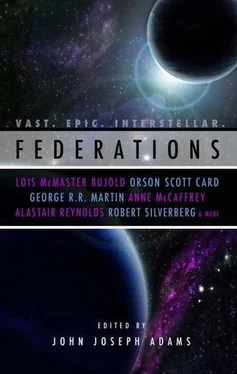I looked at her as though she had begun to babble the way Fazio had. Elisandra and I had been together almost a year, but there were times I felt I didn’t know her at all.
“Well?” she said.
“Are you serious?”
“You owe it to him. You owe him a death, Chollie. He can’t come right out and say it, because the symbiont won’t allow him to. But that’s what he wants from you.”
I couldn’t deny any of that. I’d been thinking the same thing for at least the past hour. The reality of it was inescapable: I had muffed things on Weinstein and sent Fazio to hell for ten years. Now I had to set him free.
“If there was only some way to get the symbiont out of his brain—”
“But there isn’t.”
“No,” I said. “There isn’t.”
“You’ll do it for him, won’t you?”
“Quit it,” I said.
“I hate the way he’s suffering, Chollie.”
“You think I don’t?”
“And what about you? Suppose you fail him a second time. How will you live with that? Tell me how.”
“I was never much for killing, Ellie. Not even Ovoids.”
“We know that,” she said. “But you don’t have any choice this time.”
I went to the little fireglobe she had mounted above the sleeping platform, and hit the button and sent sparks through the thick coiling mists. A rustle of angry colors swept the mist, a wild aurora, green, purple, yellow. After a moment I said quietly, “You’re absolutely right.”
“Good. I was afraid for a moment you were going to crap out on him again.”
There was no malice in it, the way she said it. All the same, it hit me like a fist. I stood there nodding, letting the impact go rippling through me and away.
At last the reverberations seemed to die down within me. But then a great new uneasiness took hold of me and I said, “You know, it’s totally idiotic of us to be discussing this. I’m involving you in something that’s none of your business. What we’re doing is making you an accomplice before the fact.”
Elisandra ignored me. Something was in motion in her mind, and there was no swerving her now. “How would you go about it?” she asked. “You can’t just cut someone’s throat and dump him down a disposer chute.”
“Look,” I said, “do you understand that the penalty could be anything up to—”
She went on. “Any sort of direct physical assault is out. There’d be some sort of struggle for sure—the symbiont’s bound to defend the host body against attack—you’d come away with scratches, bruises, worse. Somebody would notice. Suppose you got so badly hurt you had to go to the medics. What would you tell them? A barroom brawl? And then nobody can find your old friend Fazio who you were seen with a few days before? No, much too risky.” Her tone was strangely businesslike, matter-of-fact. “And then, getting rid of the body—that’s even tougher, Chollie, getting fifty kilos of body mass off the Station without some kind of papers. No destination visa, no transshipment entry. Even a sack of potatoes would have an out-invoice. But if someone just vanishes and there’s a fifty-kilo short balance in the mass totals that day—”
“Quit it,” I said. “Okay?”
“You owe him a death. You agreed about that.”
“Maybe I do. But whatever I decide, I don’t want to drag you into it. It isn’t your mess, Ellie.”
“You don’t think so?” she shot right back at me.
Anger and love were all jumbled together in Elisandra’s tone. I didn’t feel like dealing with that just now. My head was pounding. I activated the pharmo arm by the sink and hastily ran a load of relaxants into myself with a subcute shot. Then I took her by the hand. Gently, trying hard to disengage, I said, “Can we just go to bed now? I’d rather not talk about this any more.”
Elisandra smiled and nodded. “Sure,” she replied, and her voice was much softer.
She started to pull off her clothes. But after a moment she turned to me, troubled. “I can’t drop it just like that, Chollie. It’s still buzzing inside me. That poor bastard.” She shuddered. “Never to be alone in his own head. Never to be sure he has control over his own body. Waking up in a puddle of piss, he said. Speaking in tongues. All that other crazy stuff. What did he say? Like feeling an ant wandering around inside his skull? An itch you can’t possibly scratch?”
“I didn’t know it would be that bad,” I said. “I think I would have killed him back then, if I had known.”
“Why didn’t you anyway?”
“He was Fazio. A human being. My friend. My buddy. I didn’t much want to kill Ovoids, even. How the hell was I going to kill him?”
“But you promised to, Chollie.”
“Let me be,” I said. “I didn’t do it, that’s all. Now I have to live with that.”
“So does he,” said Elisandra.
I climbed into her sleeptube and lay there without moving, waiting for her.
“So do I,” she added after a little while.
She wandered around the room for a time before joining me. Finally she lay down beside me, but at a slight distance. I didn’t move toward her. But eventually the distance lessened, and I put my hand lightly on her shoulder, and she turned to me.
An hour or so before dawn she said, “I think I see a way we can do it.”
• • •
We spent a week and a half working out the details. I was completely committed to it now, no hesitations, no reservations. As Elisandra said, I had no choice. This was what I owed Fazio; this was the only way I could settle accounts between us.
She was completely committed to it, too: even more so than I was, it sometimes seemed. I warned her that she was needlessly letting herself in for major trouble in case the Station authorities ever managed to reconstruct what had happened. It didn’t seem needless to her, she said.
I didn’t have a lot of contact with him while we were arranging things. It was important, I figured, not to give the symbiont any hints. I saw Fazio practically every day, of course—Betelgeuse Station isn’t all that big—off at a distance, staring, glaring, sometimes having one of his weird fits, climbing a wall or shouting incoherently or arguing with himself out loud; but generally I pretended not to see him. At times I couldn’t avoid him, and then we met for dinner or drinks or a workout in the rec room. But there wasn’t much of that.
“Okay,” Elisandra said finally. “I’ve done my part. Now you do yours, Chollie.”
Among the little services we run here is a sightseeing operation for tourists who feel like taking a close look at a red giant star. After the big stellar-envelope research project shut down a few years ago we inherited a dozen or so solar sleds that had been used for skimming through the fringes of Betelgeuse’s mantle, and we began renting them out for three-day excursions. The sleds are two-passenger jobs without much in the way of luxury and nothing at all in the way of propulsion systems. The trip is strictly ballistic: we calculate your orbit and shoot you out of here on the big repellers, sending you on a dazzling swing across Betelgeuse’s outer fringes that gives you the complete light show and maybe a view of ten or twelve of the big star’s family of planets. When the sled reaches the end of its string, we catch you on the turnaround wheel and reel you in. It sounds spectacular, and it is; it sounds dangerous, and it isn’t. Not usually, anyhow.
I tracked Fazio down in the gravity lounge and said, “We’ve arranged a treat for you, man.”
The sled I had rented for him was called the Corona Queen. Elisandra routinely handled the dispatching job for these tours, and now and then I worked as wheelman for them, although ordinarily I wheeled the big interstellar liners that used Betelgeuse Station as their jumping-off point for deeper space. We were both going to work Fazio’s sled. Unfortunately, this time there was going to be a disaster, because a regrettable little error had been made in calculating orbital polarity, and then there would be a one-in-a-million failure of the redundancy circuits. Fazio’s sled wasn’t going to go on a tour of Betelgeuse’s far-flung corona at all. It was going to plunge right into the heart of the giant red star.
Читать дальше












